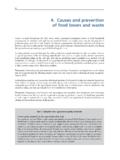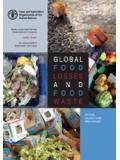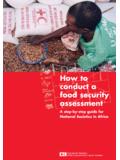Transcription of The Anatomy of A Silent Crisis - Global Humanitarian Forum
1 Human Impact ReportClimate ChangeThe Anatomy of A Silent CrisisCover Picture:Laurent Weyl, Collectif Argos. Elderly woman looking after her cow on top of a large dyke. Sea-level rise and changing monsoon patterns have changed the landscape where she grew up. District of Satkhira, Bangladesh: Le grand debordement Introduction Kofi Annan President, Global Humanitarian ForumAdvisory panel members Nitin DesaiMember, Prime Minister s Council on Climate Change, India; Distinguished Fellow, The Energy and Resources Institute (TERI)Jan Egeland Director, Norwegian Institute of International Affairs; UN Under-Secretary-General for Humanitarian Affairs and Emergency Relief Coordinator (2003-2006)Saleemul HuqSenior Fellow, Climate Change, International Institute for Environment and Development (IIED), LondonAndreas Merkl Director, Global Initiatives, ClimateWorks Foundation, San FranciscoRajendra K.
2 PachauriChairman, Intergovernmental Panel on Climate Change (IPCC); Director General, The Energy and Resources Institute (TERI); Director, Yale Climate and Energy InstituteJohan Rockstr mExecutive Director, Stockholm Environment Institute (SEI) and Stockholm Resilience CentreJeffrey Sachs Director, The Earth Institute, Columbia University , New York; Quetelet Professor of Sustainable Development and of Health Policy and Management, Columbia University; Special Adviser to the UN Secretary-General on the Millennium Development GoalsHans Joachim Schellnhuber Founding Director, Potsdam Institute for Climate Impact Research (PIK);Member, Intergovernmental Panel on Climate Change (IPCC)Barbara Stocking Chief Executive, Oxfam GB, Oxford, EnglandKlaus T pfer Executive Director, United Nations Environment Programme (1998-2006)Margareta Wahlstr m United Nations Assistant Secretary-General, Disaster Risk ReductionConclusion Walter Fust CEO/Director-General, Global Humanitarian Forum ; Chair, Steering Group, Human Impact Report: Climate ChangeToday, millions of people are already suffering because of climate deathly silence of this Crisis is a major impediment for international action to end report tries to document the impact of climate change on human life globally.
3 Science is only beginning to address the human impact of climate change. However, dozens of research organizations and experts contributing to this report can agree on the widespread damage it causes. We feel it is the most plausible account of the current impact of climate change A. Annan, President of the Global Humanitarian Forum Introduction>Message from the PresidentiiWithout describing the full picture of the challenge, we cannot expect our response to match its scale. And we can no longer hold back from speaking out on the Silent suffering of millions already show that people worldwide are concerned about climate change. Communities on the climate frontlines already see and feel the change. But awareness about the impacts of climate change is low, particularly among the poor.
4 In industrialized countries, climate change is still considered a solely environmental problem. It is seen as a distant threat that might affect our future. A viewpoint reinforced by pictures of glaciers and polar bears not human yet Australia is witnessing a full decade of drought. Large tracts of the United States are exposed to stronger storms and severe water shortages leading to crop loss, job loss, fires, and testify here to the human face of this dangerous problem. The first hit and worst affected by climate change are the world s poorest groups. Ninety-nine percent of all casualties occur in developing countries. A stark contrast to the one percent of Global emissions attributable to some 50 of the least developed nations.
5 If all countries were to pollute so little, there would be no climate effects of pollution driven by economic growth in some parts of the world are now driving millions of people into poverty elsewhere. At the same time, decades-old aid pledges continue to go unmet. The Millennium Development Goals are endangered. And the poor lack capacity to make their voices heard in international arenas, or attract public and private investment. For those living on the brink of survival, climate change is a very real and dangerous hazard. For many, it is a final step of does a fisherman go when warmer sea temperatures deplete coral reefs and fish stocks? How can a small farmer keep animals or sow crops when the water dries up? Or families be provided for when fertile soils and freshwater are contaminated with salt from rising seas?
6 Climate change is an all encompassing threat, directly affecting the environment, the economy, health and safety. Many communities face multiple stresses with serious social, political and security implications, both domestically and abroad. Millions of people are uprooted or permanently on the move as a result. Many more millions will climate policy must empower vulnerable communities to cope with these challenges. It should support the wider drive for a dignified existence for all, in harmony with the environment as well as in safety from it. This report has been realized at the last possible moment. It is being issued just six months prior to the meeting of nations at Copenhagen, Denmark, in December 2009. Copenhagen will conclude negotiations begun nearly two years ago for a new international climate agreement to succeed the Kyoto Protocol after 2009: Climate Change The Anatomy of A Silent CrisisEven the most ambitious climate agreement will take years to slow or reverse Global warming.
7 A Global carbon economy has been the basis of all productive efforts since centuries. Emissions are still steadily increasing, and the world population is set to grow by forty percent by we do not reverse current trends by close to 2020, however, we may have failed. Global warming will pass the widely acknowledged danger level of two degrees, since there is an approximately 20 year delay between emission reductions and the halting of their warming effect. This report clearly demonstrates that climate change is already highly dangerous at well below one degree of warming. Two degrees would be catastrophic. Weak political leadership as evident today is all the more alarming then. It is not, however, surprising, since so few people are aware of just how much is at stake.
8 That we are already this far into the most important negotiations ever for the future of this planet without a clear idea of the full impact of climate change on human society speaks volumes in itself. In this respect, I hope that the report will change political attitudes, spur public debate and more needs to be the most ambitious international agreement ever negotiated. The alternative is mass starvation, mass migration, and mass sickness. If political leaders cannot assume responsibility for Copenhagen, they choose instead responsibility for failing humanity. In 2009, national leadership goes beyond the next elections, and far beyond national do justice to the basic needs of people around the world, Copenhagen must produce an outcome that is Global , safe, fair and binding.
9 Such an agreement is in the interests of every human being alive today. Achieving a just accord is also our shared responsibility. An agreement seen to be unjust would struggle to achieve worldwide live in a Global village and we each have a responsibility to protect our planet. Isn t it logical and equitable, therefore, to insist that those who pollute have a duty to clean up? Pollution by some affects us all. Every one of us needs to understand that pollution has a cost, and this cost must be borne by the Polluter. Least responsible for greenhouse gas emissions are the world s poorest communities who suffer most from climate change. This is fundamentally unjust. If efforts to build a Global framework to address climate change are to succeed and endure they must be based on the principles of fairness and equity.
10 People everywhere deserve climate justice. And everywhere people must stand up and demand exactly that from their representatives. A fair and just approach would facilitate agreement at the UN Climate Conference in Copenhagen later this year. We cannot afford to change is a truly Global issue. Its impacts, while skewed, are indiscriminate and threaten us all. People everywhere deserve not to suffer because of climate change. People everywhere deserve a future for their children. People everywhere deserve to have leaders who find the courage to achieve a solution to this from the PresidentivWe will not get there by shaming and blaming. We must go beyond piecemeal changes to alter the very structure of the Global economy. This will only be feasible if we manage to force a Global price on carbon that is more representative of its costs to society, calculated at over 1 trillion dollars per year today according to this report s findings.





